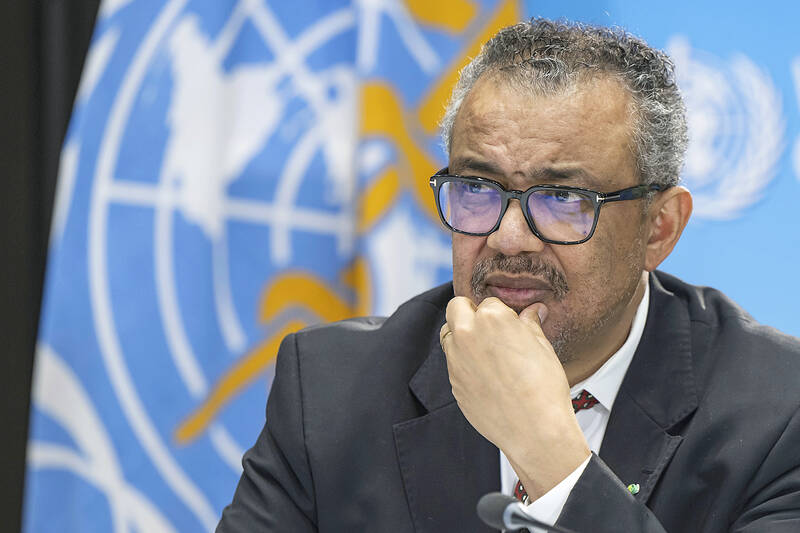The WHO chief asked global leaders to lean on Washington to reverse US President Donald Trump’s decision to withdraw from the UN health agency, insisting in a closed-door meeting with diplomats last week that the US would miss out on critical information about global disease outbreaks.
However, countries also pressed WHO at a key budget meeting on Wednesday last week about how it might cope with the exit of its biggest donor, according to internal meeting materials obtained by The Associated Press.
“The roof is on fire, and we need to stop the fire as soon as possible,” German envoy Bjorn Kummel said.

Photo: AP
For 2024-2025, the US is the WHO’s biggest donor by far, putting in an estimated US$988 million, about 14 percent of the WHO’s US$6.9 billion budget.
A budget document presented at the meeting showed that the WHO’s health emergencies program has a “heavy reliance” on US cash. “Readiness functions” in the WHO’s Europe office were more than 80 percent reliant on the US$154 million the US contributes.
The document said US funding “provides the backbone of many of WHO’s large-scale emergency operations,” covering up to 40 percent. It said responses in the Middle East, Ukraine and Sudan were at risk, in addition to hundreds of millions of dollars lost by polio-eradication and HIV programs.
The US also covers 95 percent of the WHO’s tuberculosis work in Europe and more than 60 percent of tuberculosis efforts in Africa, the Western Pacific and at the agency headquarters in Geneva, the document said.
At a separate private meeting on Wednesday last week the impact of the US exit, WHO finance director George Kyriacou said if the agency spends at its current rate, the organization would “be very much in a hand-to-mouth type situation when it comes to our cash flows” in the first half of next year.
He added that the current rate of spending is “something we’re not going to do,” according to a recording obtained by the AP.
Since Trump’s executive order, the WHO has attempted to withdraw funds from the US for past expenses, Kyriacou said, but most of those “have not been accepted.”
The US also has yet to settle its owed contributions to WHO for last year, pushing the agency into a deficit, he added.
The WHO’s executive board, made up of 34 high-level envoys, including many national health ministers, was expected to discuss budget matters during its latest session, which opened Monday and runs through Tuesday next year.
Last week, officials at the US Centers for Disease Control and Prevention were instructed to stop working with the WHO immediately.
WHO Director-General Tedros Adhanom Ghebreyesus told the attendees at the budget meeting that the agency was still providing US scientists with some data — though it is not known what data.
“We continue to give them information because they need it,” Tedros said, urging member countries to contact US officials. “We would appreciate it if you continue to push and reach out to them to reconsider.”
Among other health crises, the WHO is working to stop outbreaks of Marburg virus in Tanzania, Ebola in Uganda and mpox in Congo.
Officials from countries including Bangladesh and France asked what specific plans the WHO had to deal with the loss of US funding and wondered which health programs would be cut as a result.
The AP obtained a document shared among some WHO senior managers that laid out several options, including a proposal that each major department or office might be slashed in half by the end of the year.
The WHO declined to comment on whether Tedros had privately asked countries to lobby on the agency’s behalf.
Some experts said that while the departure of the US was a major crisis, it might also serve as an opportunity to reshape global public health.
Less than 1 percent of the US health budget goes to the WHO, said Matthew Kavanagh, director of Georgetown University’s Center for Global Health Policy and Politics.
In exchange, the US gets “a wide variety of benefits to Americans that matter quite a bit,” he said.
That includes intelligence about disease epidemics globally and virus samples for vaccines.
Kavanagh added that the WHO is “massively underfunded,” describing the contributions from rich countries as “peanuts.”

ANGER: A video shared online showed residents in a neighborhood confronting the national security minister, attempting to drag her toward floodwaters Argentina’s port city of Bahia Blanca has been “destroyed” after being pummeled by a year’s worth of rain in a matter of hours, killing 13 and driving hundreds from their homes, authorities said on Saturday. Two young girls — reportedly aged four and one — were missing after possibly being swept away by floodwaters in the wake of Friday’s storm. The deluge left hospital rooms underwater, turned neighborhoods into islands and cut electricity to swaths of the city. Argentine Minister of National Security Patricia Bullrich said Bahia Blanca was “destroyed.” The death toll rose to 13 on Saturday, up from 10 on Friday, authorities

Local officials from Russia’s ruling party have caused controversy by presenting mothers of soldiers killed in Ukraine with gifts of meat grinders, an appliance widely used to describe Russia’s brutal tactics on the front line. The United Russia party in the northern Murmansk region posted photographs on social media showing officials smiling as they visited bereaved mothers with gifts of flowers and boxed meat grinders for International Women’s Day on Saturday, which is widely celebrated in Russia. The post included a message thanking the “dear moms” for their “strength of spirit and the love you put into bringing up your sons.” It

In front of a secluded temple in southwestern China, Duan Ruru skillfully executes a series of chops and strikes, practicing kung fu techniques she has spent a decade mastering. Chinese martial arts have long been considered a male-dominated sphere, but a cohort of Generation Z women like Duan is challenging that assumption and generating publicity for their particular school of kung fu. “Since I was little, I’ve had a love for martial arts... I thought that girls learning martial arts was super swaggy,” Duan, 23, said. The ancient Emei school where she trains in the mountains of China’s Sichuan Province

DISASTROUS VISIT: The talks in Saudi Arabia come after an altercation at the White House that led to the Ukrainian president leaving without signing a minerals deal Ukrainian President Volodymyr Zelenskiy was due to arrive in Saudi Arabia yesterday, a day ahead of crucial talks between Ukrainian and US officials on ending the war with Russia. Highly anticipated negotiations today on resolving the three-year conflict would see US and Ukrainian officials meet for the first time since Zelenskiy’s disastrous White House visit last month. Zelenskiy yesterday said that he would meet Saudi Arabian Crown Prince Mohammed bin Salman, the nation’s de facto leader, after which his team “will stay for a meeting on Tuesday with the American team.” At the talks in the Red Sea port city of Jeddah, US